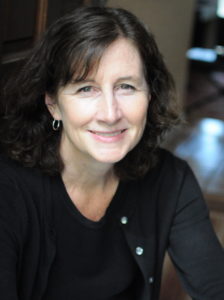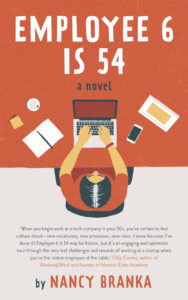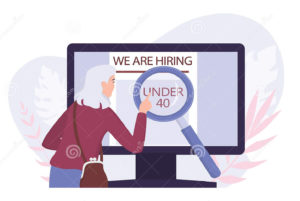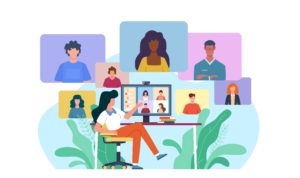Interview With Nancy Branka
 It was my great pleasure to spend some time speaking with Nancy Branka, author of Employee 6 Is 54 and founder of Startup Decoder, a wonderful online resource. Here’s how Nancy describes Startup Decoder on its homepage: “We’re a community of people who are mid- and late-career working in tech.” At Startup Decoder, Nancy writes “a useful weekly email with inspiration, career advice and tech news–with an edge towards older perspectives.” Yay! Tech info for people who weren’t raised on a diet of tech–and may need a few supplements to be on their best game. Nancy entered the tech startup world–an overwhelmingly young, male world–when she was well into her 50s. She’s full of wonderful insights–all gleaned from experience–and is an inspiring model of stepping outside of one’s comfort zone! She’s also written a darn good book! Sit back. Read, and enjoy!
It was my great pleasure to spend some time speaking with Nancy Branka, author of Employee 6 Is 54 and founder of Startup Decoder, a wonderful online resource. Here’s how Nancy describes Startup Decoder on its homepage: “We’re a community of people who are mid- and late-career working in tech.” At Startup Decoder, Nancy writes “a useful weekly email with inspiration, career advice and tech news–with an edge towards older perspectives.” Yay! Tech info for people who weren’t raised on a diet of tech–and may need a few supplements to be on their best game. Nancy entered the tech startup world–an overwhelmingly young, male world–when she was well into her 50s. She’s full of wonderful insights–all gleaned from experience–and is an inspiring model of stepping outside of one’s comfort zone! She’s also written a darn good book! Sit back. Read, and enjoy!
Diane: Welcome Nancy! I’m very excited to talk to you today! I read your book Employee 6 Is 54 and really enjoyed it! It was published in August of 2020, right?
Nancy: That’s right!
Diane: Can you give us like a brief description of what it’s about?
Nancy: Sure. It’s a novel about a woman who leaves her job rather suddenly and finds herself in the job market when she’s 54. It feels like a curse: “Oh my gosh, I’m expensive, I’m older than most of the workforce and I’m overqualified for most available jobs.” When she is introduced to a startup founder who needs her expertise in a certain area of hotel sales, her journey begins—in a startup where she’s the lone baby boomer and everybody else is quite young and male.
Diane: She’s the baby boomer and everyone else is a baby. Right?
Nancy: Yeah.
“I Was the Baby Boomer with the Babies, and It Was Such a Crazy Ride”
 Diane: So what you didn’t say about the book is that it’s actually quite funny. There are so many references that people of a certain age will get, that really made me smile, made me laugh. And the whole journey is very interesting and it relates to your personal journey as well.
Diane: So what you didn’t say about the book is that it’s actually quite funny. There are so many references that people of a certain age will get, that really made me smile, made me laugh. And the whole journey is very interesting and it relates to your personal journey as well.
What I found fascinating is that I don’t think there’s all that much fiction out there about people, especially women, over 50 entering the job force in a different way. There’s a lot about care-taking of parents, which you also have in the book; adult children, which you have in there too; about relationships and starting new relationships. But I’m not aware of all that much out there about women over 50 in the workforce.
Nancy: That’s interesting, I never thought about that, but I think that’s true. There is a lot about work in tech, but it’s always from the younger person’s point of view because most people in tech are young. And there is a fair amount regarding care-taking. In fact, one of the inspirations for me in writing this book was Still Alice about Alzheimer’s. I think a lot of times fiction writing springs from your own interests and obviously it did for me.
Diane: I think they’re missing a big audience. I think it reflects how often women over 50 are just not seen. So thank you for bringing us into the spotlight here. Let’s talk about how the book reflects your own experience.
“It Was Funny, It Was Terrifying, It Was Super Challenging”
Nancy: I identify in my career as a writer and editor. When I was 58, the magazine that I worked for was shuttered and I took a few months to figure out what was next. I was approached on LinkedIn by a founder of a startup that at the time was about business travel. The magazine I had worked for prior was about business travel, so we began talking and he hired me to head up the content. I worked there for four years. I was the baby boomer with the babies, and it was such a crazy ride, so different from any kind of environment that I had worked in before. I knew nothing about how venture capital worked and why a VC backed company would be totally different than American Express Publishing where I worked before.
I knew nothing about software development and was thrown into meetings with developers. I had no idea what they were talking about. And then that whole cultural thing about working with kids and having just a whole different life than they had. So it was a crazy ride, it was funny, it was terrifying, it was super challenging. After I left, I felt as a writer I wanted to dig into that.
Diane: You really showed a lot of the challenges. One of the funny things I remember off the top of my head was your learning about Slack. I don’t think you had heard of Slack and many tech things these kids grew up with on a daily basis. You had to figure it all out. So it’s the age, but when you worked was it all men?
“I Was Very Interested in Providing Content for People Like Me Who Have Worked in Traditional Companies and Who Wanted to Make a Jump into a Startup”
Nancy: There was one young woman who actually worked for me, who was probably 23 when she started. But as we hired people and grew, I was always like, “We have to hire women.” And then they looked at me, “Well, it’s illegal to specify that.” And I said, “Well, fair enough, but we do need to diversify.”
Diane: So you helped them diversify, at least in terms of gender and age. Right?
Nancy: At least about that, yes.
Diane: Good. So now you’re involved in Startup Decoder. Tell us about that.
Nancy: That’s my non-fiction, more journalistic side. When I left the startup, I was very interested in providing content for people like me who have worked in traditional companies and who wanted to make a jump into a startup. And as I said, it’s a whole different way of running a business and a whole different world. I think there is a great need for startups and tech companies at a certain growth point to hire for non- technical roles, for example, in sales or marketing, people who have a Rolodex in a certain vertical.
People have a lot of contacts they’ve built up over the years. That’s a really good fit for an older, more experienced person but who maybe hasn’t worked in a startup before. So my intention was to create a body of work that would help such a person jumpstart their new startup life by giving them the background they would need to understand this.
“I Shifted a Bit to Focus More on Ageism and the Issues Surrounding That”
 As I started meeting people in this area, I learned that what was really top-of-mind for them was ageism. So it wasn’t really this discomfort with, “Oh, what’s it like in a startup?” It’s more like, “Oh my gosh, ageism is so prevalent in tech and what are we going to do about that?” So I shifted a bit to focus more on ageism and the issues surrounding that. I do that on Startup Decoder. I write a weekly blog post and have a newsletter and I try to circulate in places where this is what people are talking about, particularly in tech.
As I started meeting people in this area, I learned that what was really top-of-mind for them was ageism. So it wasn’t really this discomfort with, “Oh, what’s it like in a startup?” It’s more like, “Oh my gosh, ageism is so prevalent in tech and what are we going to do about that?” So I shifted a bit to focus more on ageism and the issues surrounding that. I do that on Startup Decoder. I write a weekly blog post and have a newsletter and I try to circulate in places where this is what people are talking about, particularly in tech.
Diane: I bet that a lot of the stuff would apply outside of tech as well.
Nancy: Yeah, definitely, although it’s much more obvious in tech—also the intersectionality with women. Statistically, there are fewer females in tech and it is heavily dominated by younger generations.
Diane: So one big thing we talk about all the time in the blog is being afraid and “doing it anyway,” stepping outside your comfort zone, which you did, for sure. What was your greatest fear when you went into a startup?
Nancy: I think it was appearing stupid. Not knowing what I was doing. In retrospect that goes with the territory in a startup because by definition the company doesn’t really know what it’s doing, which is why you have these pivots. Interestingly, it didn’t occur to me at the time, but most of those younger people didn’t know what they were doing. We were all definitely learning, but they didn’t seem to be as afraid about it as I was.
Diane: Do think that’s a generational thing? Do you think that as we get older, we are more afraid of being judged? Because a lot of the young kids are very self-assured, not always warranted.
“Men Will Apply for Jobs If They Only Have 60% of the Specified Qualifications, Whereas Women Won’t Apply Unless They Have a 100% of the Job Specifications”
Nancy: That’s a good question. I think part of it is generational. I think being a woman was part of that for me, too. I was raised in a family of all boys, all brothers. I went to a college where I was in a very distinct minority as a woman, so I was always trying to prove myself regarding my intelligence and expertise somehow, like that would carry me through.
Diane: And being raised with all boys you probably had some good models of how to put yourself out there and be self-confident.
Nancy: Right. I recently heard that statistic again that men will apply for jobs if they only have 60% of the specified qualifications, whereas women won’t apply unless they have a 100% of the job specifications.
Diane: I think we have to change that picture, on both ends, come to something in the middle. So you’ve been writing about ageism in the workplace and looking at that. What do you see when you do research ageism or when people talk to you about it? What are some of the most common things you see or hear?
“I Am of a Certain Age That I Really Only Want to Do What I Want to Do at This Point”
Nancy: That people experience ageism, but it’s very hard to put their finger on concrete evidence. In tech, in particular, there’s been quite a bit of work on diversity, inclusion and equity, and there is some awareness that age is one of those -isms that should be addressed. But the formal programs are really not addressing that, whereas they are for race and gender. I have a friend who works at Slack and she heads up the employee resource group for people over a certain age. And she went to the head of diversity at Slack and said, “When will you be publishing company age statistics because you publish gender and race data?” And the woman said, “Well, we have no plans to do that.” She kind of acknowledged that there was an issue but they can’t tackle that right now.
Diane: So what kind of services do you offer at Startup Decoder? Do you do coaching or anything like that? Or is it a writing thing?
Nancy: It’s a writing thing. The first year I was thinking, “Okay, how am I going to monetize this?” But I’ve kind of come to the conclusion that I don’t want to. The things I think I could do to monetize it, I don’t want to do. I am of a certain age that I really only want to do what I want to do at this point.
“I Would Call Myself, Prior to This Moment, a Long-Suffering Employee”
 Diane: Isn’t that fabulous? You wait long enough, you get there. Right? So isn’t it great to be able to say, “No, that doesn’t work for me. I’m not that interested in that.” When did you… do you have an age point where you pivoted to that, where you just said, “You know what…?” Maybe you were always like that, but many women, and I’m thinking of myself included, have trouble saying no whenever there’s an opportunity. When someone asks you to do something, we say, “Oh, that sounds great. Yeah.” And, I’ll speak for myself, I don’t always look at all that’s involved. I’m just really getting to the point where I give myself permission to say, “No, I don’t feel like doing that. So I’m not.”
Diane: Isn’t that fabulous? You wait long enough, you get there. Right? So isn’t it great to be able to say, “No, that doesn’t work for me. I’m not that interested in that.” When did you… do you have an age point where you pivoted to that, where you just said, “You know what…?” Maybe you were always like that, but many women, and I’m thinking of myself included, have trouble saying no whenever there’s an opportunity. When someone asks you to do something, we say, “Oh, that sounds great. Yeah.” And, I’ll speak for myself, I don’t always look at all that’s involved. I’m just really getting to the point where I give myself permission to say, “No, I don’t feel like doing that. So I’m not.”
Nancy: I think I do see a moment, because I would call myself, prior to this moment, a long-suffering employee. I put up with a lot, now I see in retrospect. I was very good at working with difficult people, which I guess you could say is a strength, a certain kind of strength….
Diane: It is.
Nancy: But it leads to the long-suffering employee.
Diane: Yes.
Nancy: I had a pivotal moment when the startup founder first reached out to me. We met together in Boston and had a day-long conversation, and I remember flying to that meeting and thinking, “Okay, if he’s a jerk, I’m not going to take this job.” And that was the first time I was cognizant that what matters to me is the person I’m working with, and that could be a deal breaker for me. I really had not thought like that prior.
“A Total Stranger Offered a Very Different Type of Opportunity, in a Very Different World”
Diane: Wow. Do you think that that has to do with the magazine shutting down? When you work for a company for 16 years, you don’t always think about these things. You’re in that groove and you do what you’re supposed to do and that’s my job description and everything else that follows.
Nancy: For much of my career, one thing led to another. I really had not done a job interview since I was 25. I’d just know someone who offered an opportunity, which I’d take. And then here I was in my 50s, and a total stranger offered a very different type of opportunity, in a very different world. I think it was enough of a break from my traditional path, that it gave me the chance to think, “Okay, what do I really want here? ” And as you say, I was at the age or had the wisdom or whatever, I had the luxury to know that the best thing is to pick what you want.
Diane: I think as we get older, we tend to do more of the things that we want to do, but we have to have a luxury to be able to do that as well. And I’m glad you mentioned luxury because not everybody has that luxury, most people don’t actually.
So this is your first book, right?
Nancy: Yes, with an asterisk. I had published two other novels under a pen name.
Diane: Oh, what were they about?
Nancy: They were romance novels, a little racy, so I was reluctant to put my professional name on them. But right now I’m in the process of moving them from R rated to PG and then republishing them under my own name.
“I Had the Majority of the Book Written and Edited by January of 2020, and Then I Became Paralyzed at the Thought of Actually Publishing It”
 Diane: Oh, okay. So you won’t give us the links to those at this point?
Diane: Oh, okay. So you won’t give us the links to those at this point?
Nancy: Ha! No…..
Diane: That’ll come in the future! Is that hard to change from R to PG and still make it juicy enough?
Nancy: Well, yes, it is. But doable.
Diane: They do say that the juiciest sex writing is more about the lead up to the sex scenes. Was it a fun process for you writing this book?
Nancy: Yes. It was fun. Up until a point. I will say, and maybe you as a writer can relate it to this–I got stalled. I had the majority of the book written and edited by January of 2020, and then I became paralyzed at the thought of actually publishing it. That last 4% was very challenging and, in the end, I just had to give myself a deadline and go for it.
Diane: Those deadlines are magical, aren’t they?
Nancy: Yes!
Diane: They really are. I had a lot of fun reading it. I learned a lot about the business world, about the startup world especially, which is not a world I’m familiar with, so that was a lot of fun. But a few things I liked that I think are unique to the book is that you make clear that judgment works both ways. All the way through, you write a lot about the judgment the young kids might have about you, but, especially towards the end, you kind of bring in your judgment of them. I think that’s something we all can benefit from taking a look at. Did you see that in real work experience?
“There is a Very Common Dynamic, Where Older People in the Workplace, Talk about “The Kids”
Nancy: I did. I saw my own judgment. It’s funny when I turned 50, I remember thinking like, “Okay, this is the year that I’m going to remove all judgment from my life.” And little did I realize what a gigantic, decades-long, impossible process that was going to be! One of the things I tried to do in the book was to bring to light the vision I see for companies, where there are intergenerational teams that work well together, where all ages contribute uniquely. And so I think you can’t do that unless those on the boomer side of the equation are also aware of their own judgments.
Diane: That definitely comes through—not only in the main character, but her husband, too, in his relationship with the young man who’s going to take over the business.
Another thing I wanted to talk to you about was that your protagonist didn’t want to be the “office mom.”
I wonder… were you the office mom in real life or did people try to pull you into that role?
Nancy: I don’t think I was. I will say that the founder of the company where I worked was fantastic. Age was not an issue for him, or he never would have hired me. And I was never caused to feel apart from the people I was working with—if I did, it was all on me.
I never really felt like the office mom. I did sometimes feel like the office confidant, but I think that was more because of my personality than the mom role. But there is a very common dynamic, where older people in the workplace, talk about “the kids.”
“You Don’t Want to Talk about the Kids Because That Makes You the Mom”
 When you start talking about the kids, you’re saying, “I’m in a different generation than you,” and you’re putting a power dynamic in there, which is false. You don’t want to talk about the kids because that makes you the mom, and you really don’t want to be the mom because that’s like the caregiver of the team. That’s just not a healthy work environment. I find myself still doing it. I try to check it. That’s probably the most common ageist thing I hear from older people is this concept of working with “kids.”
When you start talking about the kids, you’re saying, “I’m in a different generation than you,” and you’re putting a power dynamic in there, which is false. You don’t want to talk about the kids because that makes you the mom, and you really don’t want to be the mom because that’s like the caregiver of the team. That’s just not a healthy work environment. I find myself still doing it. I try to check it. That’s probably the most common ageist thing I hear from older people is this concept of working with “kids.”
Diane: And it’s their biases.
Nancy: Yes.
Diane: It’s interesting. I went back to school recently. My program had a few people my age, but most of them were in their early thirties, mid-thirties and it was so refreshing. It was so wonderful and I’m really good friends with some of them now. Every once in a while, I can feel the generation thing, but I don’t see that necessarily as a negative. I see it just, “Okay, we’re going to have different experiences to share.” If you come in with a more open mind, there’s the intergenerational collaborations can be so fabulous.
Nancy: Yes, I totally agree.
Diane: And I have a thing about office mother—and I’m just going to run this by you—maybe it’s how you define “mother.” I mean, if we look at mother in terms of our cultural, this culture’s view of mother as the booboo fixer and the nurturer and the hugger and the feeder and everything else, maybe not so much, but mothers can also be wonderful leaders and inspire growth and say, “No, you can do that on your own.” So I think there’s stuff from the mother that we shouldn’t just force away.
“I Love Learning New Things, So It’s Challenging, But Interesting”
Nancy: It’s so important. I had a conversation with a manager recently who felt like a lot of the younger people on her team were thinking of her as a mom. And then she said there was one person on the team who didn’t seem to notice her age at all, and my first thought was, “Oh, I’d like to know more about that person’s mother.”
Diane: Interesting. That’s interesting. We say “mother” and just assume that everybody has the same kind of picture of mother, but mother means a lot of different things.
How are you feeling now that the book’s out in the world?
Nancy: I feel good, now it’s the challenge of marketing, which brings out a whole other set of skills or lack thereof, that’s challenging. I love learning new things, so it’s challenging, but interesting.
Diane: Wonderful.
Nancy: And as I said, I really enjoy writing the fiction so I’m looking towards writing more. Somebody suggested, “Oh, you should write a sequel to this book. Its end suggests a future.” I don’t know about that, but I would like to continue with fiction writing.
Diane: Do you have any projects going right now? Aside from making your R stuff PG? You have to tone down two and write two more?
Nancy: I had written drafts of two more and so I’m polishing those.
Diane: Okay. And, and the reason you’re toning it down is so you could put them in your real name and not use a pen name?
“I Picked Romance Because It’s the Biggest Selling Category and There Are Many Sub Genres within That Classification”
Nancy: Yeah. And the reason that I wrote them the way that I did was very strategic. I picked romance because it’s the biggest selling category and there are many sub genres within that classification. I was interested in the new sub-genre called new adult, which targets the age just past young adult.
Diane: So that’s for the upper teens, low twenties?
Nancy: Yes. And sex is a prominent part of their world. That genre has lot of sex in it, so that’s why I chose to write the book like that. I was following the formula in that genre.
Diane: That must’ve been fun.
Nancy: Yeah. It was fun.
Diane: You’re on the West coast?
Nancy: Yes, I’m in Northern California.
Diane: And your startup was in Northern California?
Nancy: No, it was actually in New York, which was fantastic because I worked remotely, but I spent one week a month in New York.
Diane: I’m a New Yorker. I just moved to Florida in October, but I love when people love New York. It makes me happy. So, you’re going to focus on the romance books, but any ideas for a new fiction plot after that’s done? Do you think it’s going to be business related?
Nancy: I do like to write about what interests me in the real world, so honestly, I’m not really sure yet.
Diane: You’ll find out when you sit down to write, isn’t that how it works?
Nancy: Yeah. I just wrote a short story about a dentist. I had a very bad dentist appointment and I’m like, “Okay, I’m going to make use of this.”
“The Number One Thing That Comes to Mind Is to Get Support”
 Diane: That’s great. I don’t wish you any more bad appointments, but if you have any, that’s a great way to turn them around. So any advice or thoughts in general for women who are either going back into the workforce, thinking about going back into the workforce, or changing the type of work they do?
Diane: That’s great. I don’t wish you any more bad appointments, but if you have any, that’s a great way to turn them around. So any advice or thoughts in general for women who are either going back into the workforce, thinking about going back into the workforce, or changing the type of work they do?
Nancy: Yes. The number one thing that comes to mind is to get support. There are a lot of people in that same situation, and there are organizations and groups where you can normalize what you’re going through and get the support that you need. In the West coast, here in Silicon Valley, there’s a group called Reboot Accel, which is for women returners. Most would be returning after raising kids, but then also some older people who have been caregivers for their parents. Reboot Accel offers classes that are super inexpensive, coaching, and groups.
I regularly attend a meetup, called Mature Women in Tech, and it’s so great. Women there have just been so supportive of each other and also give practical advice. For example, this question came up this week, “Recruiter A told me this and recruited B told me this, and I don’t know what to do.” And then a lot of people chimed in to help her clarify. I just find old fashioned conversations and women supporting each other is what really seems to move people from across the finish line and help them achieve whatever they’re shooting for.
Diane: Finding your peeps, right?
Nancy: Exactly.
Diane: And what about aging in general?
“It’s a Good Time to be Old, I Think”
Nancy: Well, I’m all for it. As my dad always said, it’s better than the alternative.
I think we’re aging in such a great time. So many people are busting through stereotypes. Your age is what you make of it. There are so many inspiring resources to help you do it the way you want to do it, just like we’ve done the other parts of our lives. It’s a good time to be old, I think.
Diane: It is. I totally agree. And when looking for inspiration, there’s so much out there. I would put you in that category, an inspiring woman.
Nancy: It’s funny, I was going to say the same about you.
Diane: Thank you. So any other thoughts, anything else you want to add or talk about that we didn’t cover?
Nancy: No. I hope people will check out Start-up Decoder because I do show up there weekly, and I hope the conversation about age and the intersection of age and work will continue. It’s so important and it affects so many people right now, but it’s going to affect everybody at some point in their life.
Diane: It will, if they’re lucky.
Nancy: Yes.
Diane: Thank you, Nancy! This has been a great pleasure!
Nancy: Thank you, Diane.
As always, I’d love to hear your thoughts! Please leave a comment or send me an email.
And see you in two weeks!
XOXO
Diane



I really enjoyed this conversation between you & Nancy, Diane. I keep telling myself I’m not going to buy any more books until I’ve read the mountains I already have, but this book sounds incredible. I nodded in agreement throughout this wide-ranging interview; the tech sector is being forced to confront gender disparity and the lack of diversity, but yes, it hasn’t confronted institutionalized ageism yet. Hopefully Nancy’s new novel will be an important contribution to this issue. I love the book cover, too, btw! Thank you for this post 🙂
Thanks, Sarita! The interview was great fun and I think you’ll really enjoy Nancy’s book! Hopefully ageism will be confronted next–it’s about time!
Thank you for the wonderful interview, Diane. I really enjoyed your exploration of this topic. I look forward to reading this author’s book.
Thank you, Pam!! I think you’ll really enjoy the book~ It’s a truly fun and enlightening read!
Hi Diane ,
As a “long suffering techie”..this really hit home for me and I have already forwarded it to some friends and also want to discuss with my millennial daughters and plan to check out Start-up Decoder and read the book.
.Thanks for providing a “broad” spectrum of topics/content in your blog!!
PS I am “snow birding/working remote” in Broward County, Fla the past 7 weeks guess we can both be glad we are missing some cold winter weather/snow in NY .. and hopefully “AC..after covid” we can find a way to connect in person in SoFla ..maybe come up with an interesting Start-up for the growing # of “baby boomers” coming to So Fla:-)
Fran! I am so glad this hit home with a “long suffering techie!” Thank you so much for forwarding and I think you’ll really find the information on Start-Up Decoder equally interesting and inspiring! The book is great fun too!
I appreciate your nod to the broad topics on the blog! Today truly is a wonderful day NOT to be in NY shoveling! I would love to connect with you “AC.” Who knows what we will come up with together! And … please let me know what your millennial daughters have to say!
Nancy is an inspiration! So many insights for us all. Thank you for your great job of interviewing her!
Thank you, Nicky! Lots of insights for sure!
Diane you are such a wonderful interviewer and what a great article! Thank you for bringing this wonderful topic to light. Nancy’s journey through the tech world is certainly an inspiration! I’m going to check out Startup Decoder too.
Thank you, Laura!! Nancy’s journey is an inspiration–and you’ll love Startup Decoder!!
Wonderful article on Nancy! Her book was such a fun read and her wisdom is priceless. I can’t wait to dig into her new young adult books.
Thanks, Laura! Nancy does have a great deal of wisdom to offer–and fun reads! Looking forward to her new steamier writing too!